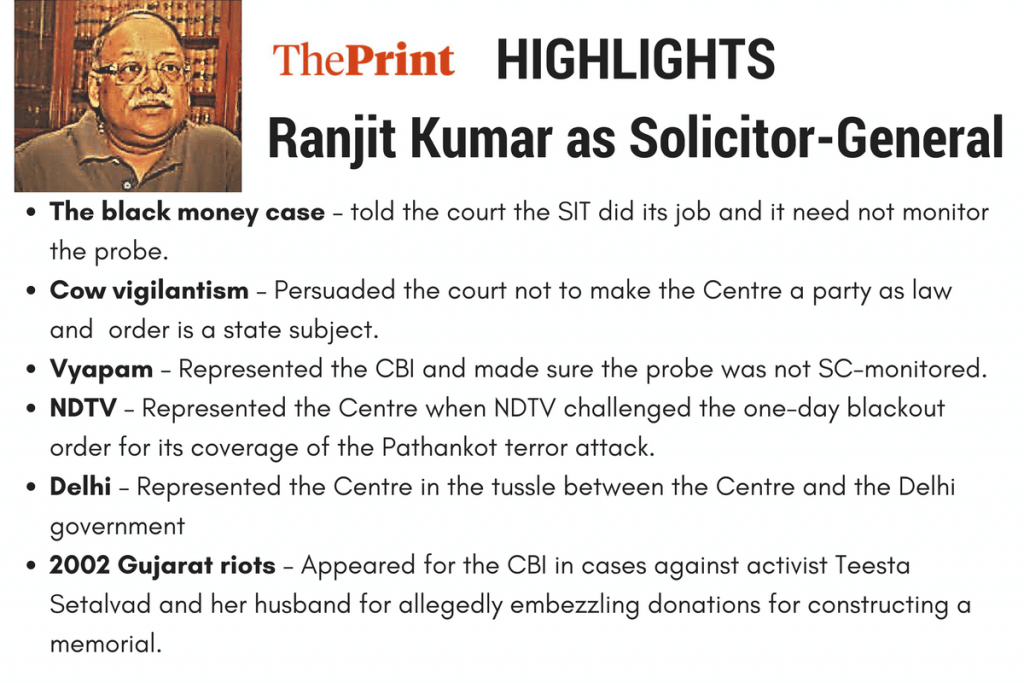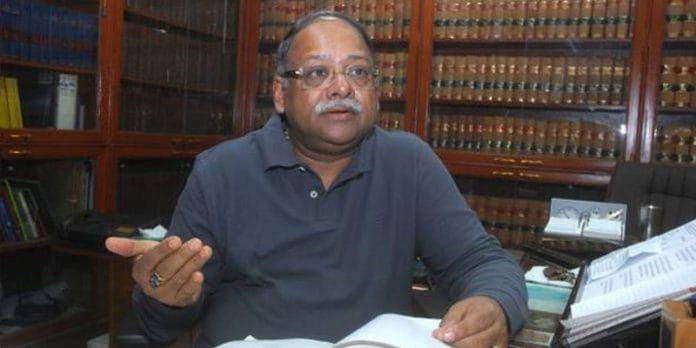Ranjit Kumar had represented Centre & CBI in many high-profile cases like black money, cow vigilantism, AgustaWestland, and Vyapam.
New Delhi: Solicitor-General Ranjit Kumar’s resignation has left the Centre’s legal team with a void to fill for its high-stakes political battles in court.
Kumar was the man the government relied upon when it was walking on thin ice in controversial cases that could have major political ramifications. He resigned on 20 October, citing “personal issues”.

He was appointed as Solicitor-General of India in 2014, and has since appeared mostly for the Central Bureau of Investigation (CBI) and the Ministry of Home Affairs, making all probes, scams, and investigations his domain.
In the case where the apex court is monitoring the Special Investigation Team probe on black money, Kumar represented the Centre, highlighting the government’s progress in each hearing. He had told the court that the SIT was no longer required since “all the issues have been redressed by the government”.
He held fort for the government in the the Vyapam, AgustaWestland, and Saradha chit fund scam cases. In the Vyapam case, he ensured that the CBI the probe was not monitored by the apex court, minimising the damage for the ruling Bharatiya Janata Party government.
Many of Kumar’s big cases have been crucial to the government. He ensured that the apex court did not entertain the bail plea of Kanhaiya Kumar, former president of the Jawaharlal Nehru University Students’ Union, when he was arrested on charges of sedition.
Last month, he persuaded the court to not make the central government a party to a case seeking guidelines to curb cow vigilantism. Although the Centre had been on the receiving end for the rise of mob violence in the name of cow protection, Kumar ensured that the court’s ire was solely on the states for not maintaining law and order.
Kumar argued against granting bail to activist Teesta Setalvad, a BJP critic, and her husband for allegedly embezzling funds collected through donations for constructing a memorial for the 2002 Gujarat riots.
He was also to appear before a constitution bench this month on the statehood and administrative powers of Delhi in the tussle between the Centre and the Delhi government. Given that Attorney-General K.K. Venugopal is unlikely to represent the Centre due to conflict of interest (he had appeared for the Delhi government in the case prior to his appointment), Kumar’s role was vital.
Prior to his appointment as Solicitor-General, Kumar was the Gujarat state counsel for many years. Among others, he represented the state in the Sohrabuddin fake encounter case.
In the last couple of weeks, many high-profile CBI and Home Ministry cases have been taken over by Additional Solicitor-General Tushar Mehta. The cases transitioned include the issue of deporting Rohingya migrants, and the Kerala inter-religious marriage case, which is being probed by the National Investigation Agency.
Sources told ThePrint that Mehta is one of the frontrunners to succeed Ranjit Kumar.
The last big political case on Kumar’s table was on the trust vote won by Tamil Nadu chief minister Edappadi K. Palaniswami. Interestingly, in a case where there is much speculation on the Centre’s role, Kumar appeared as ‘amicus curiae’ (friend of the court) to assist the court, and not on behalf of the Centre.






